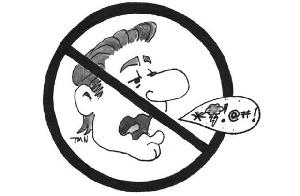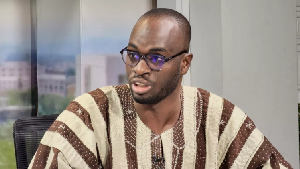It has been observed in recent times that some group of individuals in the electronic media, in the performance of their duties use indecent language which go contrary to the Ghanaian cultural norms and values, as far as our style of communication in public is concerned.
Some of these individuals are hosts of programs, presenters, discussants and news readers. While some use offensive and abusive language during the discharge of their duties, others choose to discuss their own personal and family issues which should have been completely off-air.
And yet, others use unprintable words to promote and glorify advertisements on alcoholic beverages, aphrodisiacs, and female products of some sort, and most of the time, joking with sensitive sexual issues. Surprisingly such products appear to dominate commercials on the airwaves, of late. The embellishment of it all disturbs the sensibilities of some concerned citizens of the listening public.
Meanwhile, the Ghanaian cultural norms and values abhor the use of blunt and vulgar language in public, more so, when these individuals know that their audiences constitute children, youth, parents, traditional rulers, men of God, heads of state, opinion leaders, and persons of diverse faith, as well as Ghanaians in the diaspora. Their chosen mode of communication to the public, make one ponders whether as Ghanaians, we still cherish our cultural values which our forefathers had passed on to us to help shape our destiny.
The media play critical roles in educating, informing and entertaining the public. But dear reader, just tune in to any of the F.M stations during news time, specifically at commercial breaks, and you will understand the reality of the subject under discussion.
“Child pregnancy”
The concern is being expressed now, in view of the impact their chosen mode of advertising alcoholic beverages, aphrodisiacs, etc. are likely to have on children and youth, considering the high incidence of teen pregnancy, rape and defilement cases, and hooliganism among the school going age. And what about this weird story of “child pregnancy” being recorded in some communities, of late; come to think of their resultant effect on the socio-economic development of the country in few years to come. Some people will point the writer to peer pressure, drug peddlers and what goes on in the social media. But let’s concentrate on what is nearer us, for the meantime.
For the purpose of this write-up, we shall briefly explain what culture is, importance of Ghanaian cultural values, and our style of communication in public.
What is Culture?
Mention culture and many minds quickly turn to drumming and dancing. But no. Culture goes beyond these activities. According to Anthropologist, Cristina De Rossi, culture is a way of life of a group of people – their behavior, beliefs, values, symbols that they accept generally without thinking about them that are passed along by communication and imitation from one generation to another.
Culture also encompasses food, what we wear, how we wear it, child naming, training, our language, and how we communicate. Culture is transmitted and preserved through social learning in human institutions such as the home, school, media and the chief’s palace. Cultural traditions look to the past for their mandate, authority and authenticity. Culture is not static, though. It changes over time, yet the past should be respected and preserved, the Ghanaian culture not exclusive.
Importance of Ghanaian Culture/Value
The importance of the Ghanaian culture have over the years helped shaped our growth and development, and unified us as unique individuals among comity of African nations, and elsewhere. The Ghanaian cultural values and morals were the binding pillars of society on which its very existence depends.
Cultural Values
In simple terms, value is the quality of doing good and right, and avoiding wrong. The Ghanaian cultural values and practice teach the citizens not only to be disciplined, but be also respectful, courteous, loving, generous, hospitable, and above all, hard-working. Though the Ghanaian culture is heterogeneous in nature, its rich values have been used to promote unity among the citizens since the different cultures have positive sides. These help us to create the future we want to experience, thus living a peaceful and harmonious life.
Individual conduct
Individual conduct is seen as impacting their entire family, social group and community. Therefore everyone is expected to be respectful, dignified, observant in public settings, and in most aspects of life.
For example, let an indigene gloss over a traditional value in a chief’s palace, and the reaction will be spontaneous; a sanction will be applied immediately.
Ghanaian Communication Style
Regarding communication style, Ghanaians are more indirect communicators. This means they take care not to relay information in any way that could cause issues, whether by giving someone bad news, turning down invitation, refusing a request, or any other matter. Ghanaians always want to protect their own and other’s faces, as well as maintain harmonious relationship. As a result, they tend to use proverbs, wise sayings, analogies readily. This allows ideas or messages to be convened in a manner that does not seem so blatant. In fact, those who are viewed as wise frequently speak in proverbs.
Additionally, Ghanaians precede statements which they consider may be offensive to others with words such as “S?be” or “Tafraky?”, to apologize profusely, in a way.
Ghanaian words which are translated in English words as “stupid” and “foolish” are hardly used in public. All these are not to suggest that Ghanaians are “S?be” timid or hypocrites. Rather Ghanaians as a people, are sensitive to our cultural norm and values, and as such, give much respect to them because they serve as our identity apart from being the binding pillars of the society. In this regard, Ghanaians are showing that they are knowledgeable about things said in public, likewise things said in private.
Above all, the Scriptures admonish us against unwholesome talk in public. (Ephesian 4: 29)
Impact of media on Youth & Children
As to whether the media work has any impact on the Youth and Children, some studies indicate that, “Teens and Children who watch a lot of television with sexual content are more likely to imitate sexual intercourse the year following. Likewise those who listen to advertisement on drugs and drinks and other related products on the radio, are also more likely to put them into practice. More so where some of the youth look up to some professionals in the media as their role models.
Worrying situation
It is against this background that some concerned citizens in the society find cause to complain about the indecent way of communication among some persons in the media as an affront to our cultural values and norms. To them, the situation is worrying and embarrassing as it is unacceptable to the dignity of Ghanaian citizens. Indecent language use in the media should be checked before the situation gets out of control. Otherwise, the impact on the society will be more disastrous than the menace of galamsey.
Adverts support the media industry
It should be stated that advertisements serve as a backbone for the media industry. Without commercial adverts, majority of radio and television stations cannot function. Here, there is always a win-win situation for both product manufacturers and the media authorities.
For this reason, manufacturers should deem it necessary to search for professional/seasoned advertisers who will take into consideration the Ghanaian cultural norms and values, in their attempt to package advertising messages for their products, so as to reflect the acceptance and vision of many citizens in the society.
The present situation whereby some news readers and host of programs use blunt and vulgar language to promote and glorify some products is not in the interest of our children and youth in the society, as far as their growth and future development is concerned.
Suggestions
Social awareness means one should know what is socially acceptable for one, in the society. Therefore, all citizens in the performance of their functions should take into consideration what is culturally acceptable by the Ghanaian society.
Essentially culture involves the entire fabric of the society. Hence individuals and organizations should team up to protect our cultural norms and values in the interest of posterity.
In this connection, Ministries of Information, Communication, Education, Tourism, Chieftaincy and Religion, Gender and Children, as well as Churches, Mosques, Traditional Rulers, drivers, Traditional healers, Civil Societies, opinion leaders etc. should come together to identify how culture impacts on their various areas of operation. By this, they should aim at designing and carrying out national study on the contribution of culture in relation to their respective work, and the socio-economic development of Ghana. The resulting statistics and findings will guide the work of citizens, and strengthen arguments to promote culture as a factor of sustainable development.
Conclusion: Medias Function
It should be reiterated that, the media as one arm of democracy is playing an outstanding role in the creation and shaping of public opinion and the strengthening of society. The media should therefore continue to act as “watch dog” to protect public interest against cultural malpractices which are likely to hinder the democratic governance of the country.
Obviously, Ghana’s developmental process will move a step higher if its cultural values and traditions are carefully observed, practiced and protected.
Partly sourced from Wikipedia—Free Encyclopedia.
Opinions of Friday, 15 June 2018
Columnist: Afua Sarpong Kuman Kumaah















